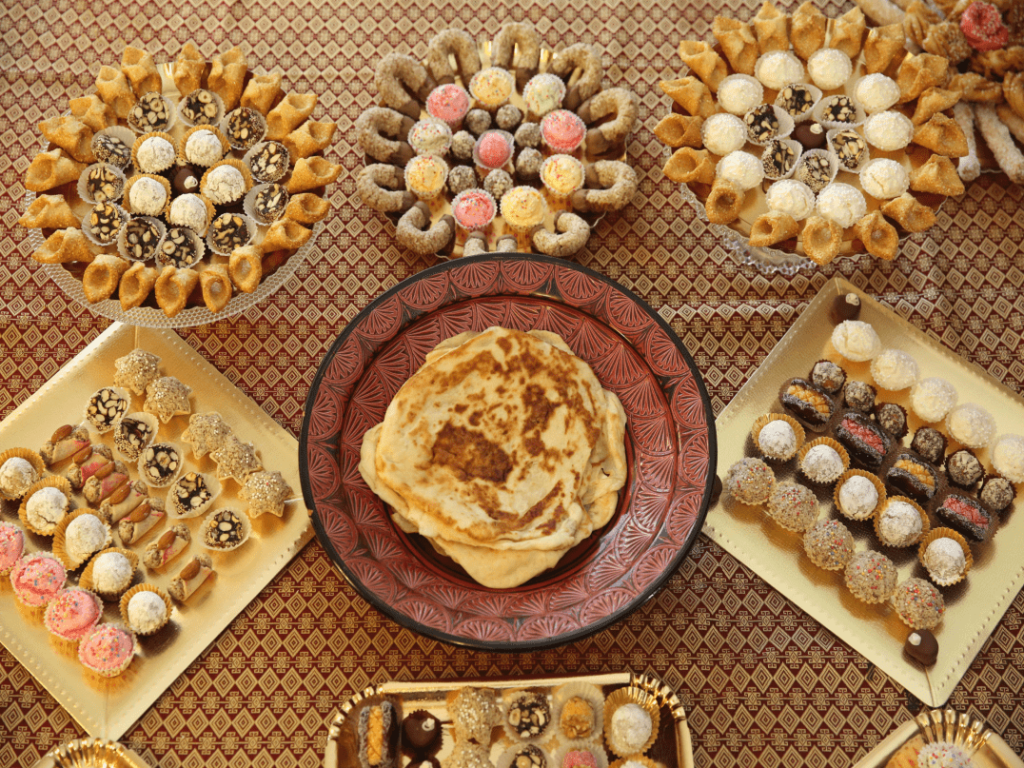Morocco is famous not only for its beautiful landscapes, rich history, spices, and colors, but also for its diverse, flavorful, and delicious cuisine, which includes its rich tradition of Moroccan sweets. In this article, we’ll take you on a tasty journey to explore some of the most famous and traditional Moroccan desserts, their ingredients, and how they are enjoyed across Morocco, reflecting the generosity and warmth of the culture.
What Makes Moroccan Sweets Special?
Moroccan sweets are full of:
- Almonds, honey, and fragrant spices.
- Orange blossom water and cinnamon.
- Traditional preparation methods passed down through generations.
Each Moroccan dessert tells a story — served in celebrations, holidays, and every joyful moment.
Popular Moroccan Desserts You Must Try
Ready to get started? From crunchy cookies to melt-in-your-mouth pastries, here are some of the most popular Moroccan desserts you must try.
Chebakia
Ramadan in Morocco is incomplete without Chebakia. This sweet is made from fried dough, folded into a flower shape, then soaked in warm honey and sprinkled with sesame seeds. Chebakia is a rich and energy-dense Moroccan sweet, perfect for breaking the fast after a long day.
Kaab el Ghazal (Gazelle Horns)
Kaab el Ghazal is one of the most famous Moroccan desserts. It is a crescent-shaped pastry filled with a delicious almond paste. This cookie is known for its rich taste and soft texture and is a Moroccan dessert often served at special occasions and holidays.
Ghriba
Ghriba is a type of Moroccan shortbread cookie. There are various kinds of Ghriba, such as Ghriba Bahla made with almonds and sesame, and Ghriba with coconut. This cookie is distinguished by its crumbly texture and delicious flavor that melts in your mouth.
Feqqas
Feqqas is a Moroccan cookie that resembles Italian biscotti. It is prepared from dough with almonds and raisins and is baked twice to make it crunchy. Feqqas is perfect for dipping in Moroccan mint tea and is served at all times.
Briouate
Briouate are small, fried pastries shaped like triangles or fingers, filled with an almond, cinnamon, and orange blossom paste. After frying, they are dipped in honey and sprinkled with sesame seeds. It’s a Moroccan dessert that’s crispy on the outside and soft on the inside.
Beghrir (Thousand-Hole Pancakes)
Beghrir is a type of Moroccan pancake. It is distinguished by its spongy texture and thousands of small holes on its surface. Beghrir is served warm, often with melted butter and honey.
Qrichlate
Qrichlate are small Moroccan cookies. They are made from flour, butter, anise, and sesame, which gives them a special aroma and taste. These cookies are served at happy occasions and holidays.
Pastilla with Milk
Pastilla with milk is a luxurious Moroccan dessert. It is made from thin layers of pastry, filled with cream (milk custard), and served cold. It is often decorated with cinnamon and fried almonds, making it a perfect sweet after a heavy meal.
Sellou / Sfouf
Sellou, also known as Sfouf, is more than just a sweet—it’s a tradition. It combines toasted almonds, flour, sesame, honey, and butter. This mix is rich in healthy proteins and fats and people typically serve it during Ramadan, where they consider it very nourishing.
Mhencha
Mhencha is one of the most beautiful Moroccan sweets. It is a large pastry coiled in the shape of a snake, filled with almond paste. Mhencha is baked until golden and then decorated with powdered sugar and cinnamon.
Common Ingredients in Moroccan Sweets
Most Moroccan desserts include:
- Almonds (ground, roasted, or whole)
- Honey (natural sweetness and shine)
- Orange blossom water (for aroma)
- Cinnamon (warm spice)
- Flour (often toasted for deeper flavor)
These ingredients give Moroccan sweets their unique taste and texture.
How to Enjoy Moroccan Desserts
To get the full experience of a Moroccan dessert, follow these tips:
- Serve with mint tea, the traditional Moroccan drink.
- Use a colorful Moroccan plate to add a cultural touch.
Why People Love Moroccan Sweets Around the World
Here’s why people around the world have fallen in love with Moroccan desserts:
- They have a lot of flavor, are healthy (many are plant-based), and look beautiful when served.
- Every bite connects you to Moroccan tradition and warmth.
- Even a simple Moroccan sweet like orange cake brings comfort and joy.
Bonus for Arabic Learners: Sweet Vocabulary
Here are some essential Arabic words that will help you better understand and savor Moroccan desserts.
| Arabic Word | Meaning |
|---|---|
| حلوى (halwa) | Dessert / sweet |
| لوز (lawz) | Almond |
| عسل (asal) | Honey |
| طحين (taheen) | Flour |
| تقليدي (taqlidi) | Traditional |
| رطب (ratib) | Moist |
| مقرمش (muqarmish) | Crunchy |
Easy Recipe: Moroccan Orange Cake
Looking to try your hand at making a delicious Moroccan dessert at home? This simple recipe for a Moroccan Orange Cake (Meskouta) is the perfect place to start.
You’ll need:
- 3 eggs
- ½ cup vegetable oil
- 1 cup orange juice
- 1 cup sugar
- 2 cups flour
- 1 tbsp baking powder
Steps:
- Mix all the ingredients in a bowl.
- Pour into a greased baking pan.
- Bake at 180°C (350°F) for 30–40 minutes.
- Let it cool and enjoy with mint tea!
Conclusion
Moroccan desserts are a delicious way to explore Moroccan culture. From crunchy chebakia to soft orange cake, each Moroccan sweet is full of flavor and tradition. Try one today and enjoy a taste of Morocco in your own home!
Download the Kaleela app now to learn Arabic through food, culture, and more!



